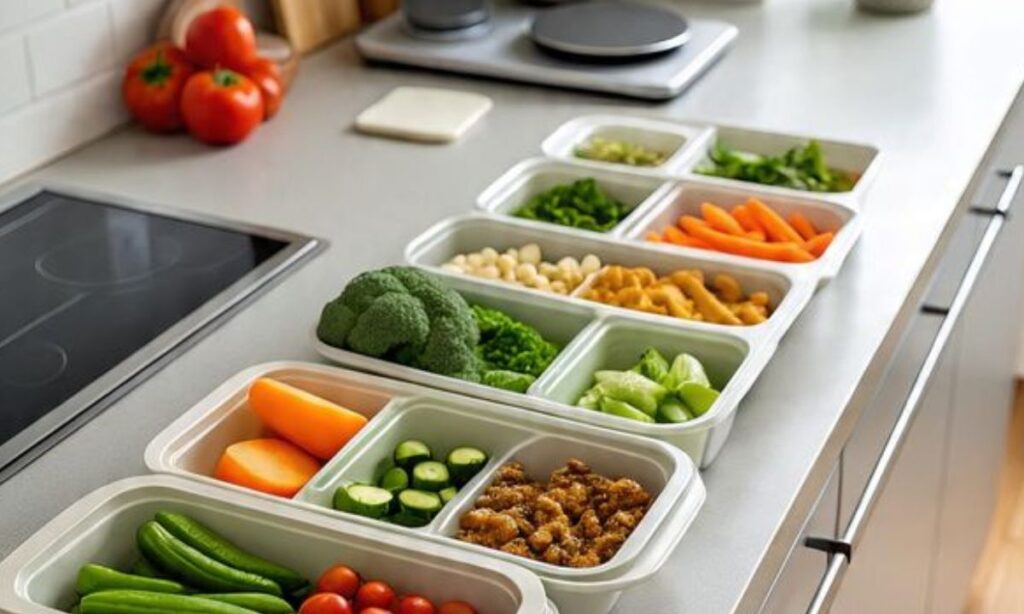Eating for heart health doesn’t have to be boring or restrictive. By planning and preparing your meals ahead of time, you can enjoy tasty, nutrient-rich dishes that support cardiovascular health. This guide covers heart-healthy meal prep ideas, tips, and FAQs to help you build a balanced eating routine.
Why Heart-Healthy Meal Prep Matters
- Reduces the intake of processed foods and unhealthy fats.
- Ensures proper portion control to maintain a healthy weight.
- Increases your intake of whole grains, lean proteins, and fresh produce.
- Saves time and reduces stress during busy weekdays.
Key Principles of Heart-Healthy Meal Prep
- Focus on whole foods: Fruits, vegetables, whole grains, and nuts.
- Limit saturated fats: Choose lean meats, low-fat dairy, and plant oils.
- Use healthy cooking methods: Steam, grill, bake, or stir-fry with minimal oil.
- Control sodium intake: Use herbs, spices, and lemon juice instead of salt.
Table 1: Heart-Healthy Ingredients to Include
| Food Group | Examples | Benefits for Heart Health |
|---|---|---|
| Whole Grains | Oats, quinoa, brown rice, whole wheat pasta | Lower cholesterol and stabilize blood sugar. |
| Lean Proteins | Chicken breast, turkey, tofu, fish | Provide essential amino acids with less saturated fat. |
| Healthy Fats | Olive oil, avocado, nuts, seeds | Support healthy cholesterol levels. |
| Colorful Vegetables | Spinach, bell peppers, carrots, broccoli | Packed with antioxidants and fiber. |
| Fruits | Berries, oranges, apples, grapes | Rich in vitamins, minerals, and heart-friendly fiber. |
Heart-Healthy Meal Prep Ideas
1. Breakfast Options
- Overnight Oats with Berries and Chia Seeds
Combine rolled oats, unsweetened almond milk, chia seeds, and fresh berries. This fiber-rich breakfast supports cholesterol management. - Veggie Egg Muffins
Whisk eggs with spinach, bell peppers, and onions, then bake in muffin tins. These protein-packed bites are easy to store and reheat.
2. Lunch Ideas
- Quinoa Salad with Chickpeas and Olive Oil Dressing
Mix cooked quinoa, chickpeas, cucumber, tomatoes, and a drizzle of olive oil with lemon juice for a heart-healthy salad. - Grilled Salmon with Steamed Broccoli
Prep portions of salmon fillets and steam broccoli in advance. Rich in omega-3 fatty acids to support heart health.
3. Dinner Choices
- Chicken Stir-Fry with Brown Rice
Use skinless chicken breast, assorted vegetables, and a low-sodium soy sauce alternative. Serve with brown rice. - Lentil Soup with Whole-Grain Bread
A fiber-packed, plant-based option that’s easy to prepare and freeze for later use.
4. Snacks
- Homemade Trail Mix (unsalted nuts, seeds, dried fruit)
- Greek Yogurt with Flaxseeds
- Apple Slices with Almond Butter
Table 2: Weekly Heart-Healthy Meal Prep Plan
| Day | Breakfast | Lunch | Dinner | Snack |
|---|---|---|---|---|
| Monday | Overnight oats + berries | Quinoa chickpea salad | Grilled salmon + broccoli | Greek yogurt + flaxseeds |
| Tuesday | Veggie egg muffins + whole-grain toast | Lentil soup | Chicken stir-fry + brown rice | Apple slices + almond butter |
| Wednesday | Overnight oats + chia seeds | Grilled salmon salad | Lentil stew + whole-grain bread | Trail mix (unsalted) |
| Thursday | Smoothie with spinach + banana | Chicken salad with olive oil dressing | Veggie stir-fry + quinoa | Nuts and berries |
| Friday | Veggie egg muffins | Quinoa bowl with roasted vegetables | Baked tofu + steamed greens | Greek yogurt + walnuts |
Meal Prep Tips for Heart Health
- Cook in batches – Prepare proteins, grains, and veggies on weekends.
- Use portioned containers – Helps control serving sizes.
- Label and date – Keeps food fresh and reduces waste.
- Incorporate seasonal produce – Adds variety and nutrients.
FAQs on Heart-Healthy Meal Prep
Q1: How long can heart-healthy meal preps last in the fridge?
Most cooked proteins, grains, and veggies last 3–4 days when stored in airtight containers.
Q2: Are frozen vegetables as healthy as fresh ones?
Yes. Frozen vegetables retain most of their nutrients and are a convenient option for meal prep.
Q3: Can I include healthy fats like nuts and seeds daily?
Absolutely. Healthy fats from nuts, seeds, and olive oil support good cholesterol and heart health when eaten in moderation.
Q4: How can I reduce sodium without sacrificing flavor?
Use herbs, spices, citrus juice, and vinegar to enhance flavor without adding extra salt.
Q5: Do I need to avoid all fats to protect my heart?
No. Focus on unsaturated fats (olive oil, avocados, nuts) and limit trans fats and saturated fats.
Key Takeaways
- A balanced mix of lean proteins, whole grains, fruits, and vegetables supports heart health.
- Meal prepping saves time, reduces stress, and encourages consistent healthy eating.
- Using herbs, spices, and healthy fats can make heart-healthy meals delicious.





